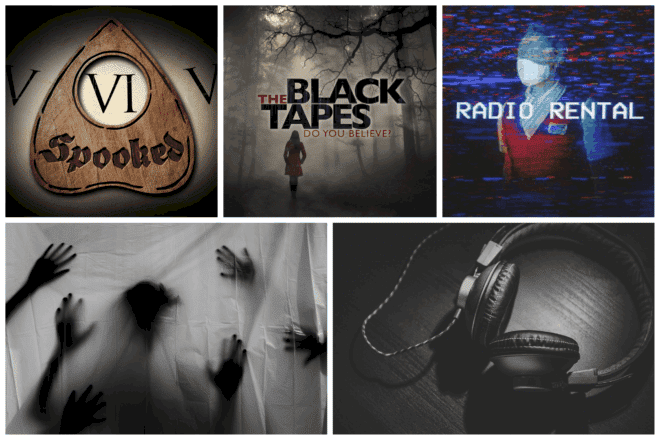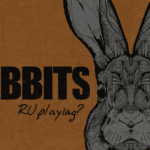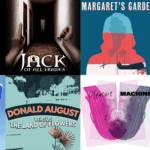3 Practical Reasons Scary Stories on Audio Hit Us So Incredibly Hard

Last updated on November 6th, 2022
It is the time of year where it is socially encouraged to have the shit scared out of you. Once the first leaf turns red in the verdant trees, everything becomes haunted: houses, hayrides, dolls. Ghost stories. Creepy stuff. Scary stories on audio formats obliterate us. Why?
Everything peacefully sitting there through the year is suddenly riddled with poltergeists, psychopaths, or beasts. Or an actual real ghost. We get into the seasonal zeitgeist. Everything is sprinkled with horror and pumpkin spice. Netflix offers a wide variety of horror movies, and the top ten scariest books begin to circle the net.
Podcasting mirrors this horrific trend. Audio storytelling of the obscure is hedging bets with literature and film, the same way Mary Shelly boasted to all those sexist writer dudes that she could write a story scarier than any of them combined.
Suck it Lord Byron…
Film and literature have mastered the genre, so will podcasting follow suit? Can audio have just as powerful experiences as films or a book by only using one sense? I would wager that there are a myriad of reasons why audio is a phenomenal medium to produce the mysterious, if not better than film and literature in some regards.
Why else did people believe Martians were invading in the War of the Worlds? Classic ghost stories audio on radio has made humanity quiver for a century.

Podcasting plays to certain parts of our psychology in ways other art forms miss. Let’s explore the areas of audio storytelling that make scary stories captivating like a throng of kids searching for the strange sounds in the woods.
What makes something scary?
There is a clear line between comedy, romance, and horror. Yet, horror might be one of the most difficult genres to master. You can’t just have a show with some celebrity voice actor scream, “There is something in the woods!!!” for 26 minutes and think the audience will get sweaty. Across mediums, for horror to work, there has to be a strong narrative and a natural building towards suspense.

Good horror writing focuses on some powerful force that outmatches the protagonist’s own– maybe aliens with advanced technology, a vengeful ghost that hops back and forth between our world and the underworld, or your neighbor with an unsettling knife collection.
Horror structure pins the protagonist against something seemingly unstoppable and puts the protagonist’s survival/soul at stake. Through the telling, good horror should make you feel as though your small intestine has formed a sailor’s knot with your large intestine and constantly tightens as the story progresses. Tension naturally builds, and there is a fast release when the monster/killer is revealed.
The ending ideally leaves the audience with the unsettling feeling that they aren’t as safe as they expected. Those dark omens hang over us longer than we’d like.
Read more: 17 Horror Audio Drama Podcasts (Beyond “The Black Tapes”)
Where film and podcasting have an advantage is with music. In all genres, music naturally enhances audio storytelling. When done right, music dials up the intensity of the moment.
When the music and script are in sync with each other, that can be enough to make you scream while on your walk because you mistook a stick for a snake. However, relying on music too heavily is usually to cover up bad writing or lack of real stakes. A short audiobook can floor us with silent, unsettling foreboding. Yet, science isn’t exactly sure why.
But when used in the right spots, it can make it hard to fall asleep at night. These techniques are used across mediums; however, I think that podcasting impacts us on a psychologically deeper level than film and literature.
Oral storytelling is in Our Bones
Podcasts as a whole tap into our oral storytelling brain. We first started sharing stories around the primordial campfire, sitting around and trading information against the soft glow of a flame.

Ok, telling stories might be a generous interpretation of the monosyllabic babbling homo-sapiens spewed out of their furry mouths, but our ancestors were able to warn each other about threatening events for sure. The most important information we exchanged was how to stay alive. We remember stories. Stories are how we passed on our heritage before language. It’s why real ghost stories, even ghost stories online have the power to undo us.
Radio Rental (Editor’s note: not to be confused with Radio Rebel) is a great example of oral storytelling focused on stories with survival stakes. Other than the wacky, lover of the strange Terry Carnation, narrated by Rainn Wilson, the show uses ordinary people living ordinary lives and has them tell their unusual flirtations with the strange that pass them by. Stories about time warps, innocuous interactions with serial killers, or people living in the crawl spaces of your home.
The Terrifying Appeal of Podcasts Done Well
The appeal of Radio Rental isn’t just that they use real people; plenty of podcasts pluck from the plebeians for their own content. The common denominator of a Radio Rental story is that no one ever really gets hurt: a knife is wielded around, a stranger might get too close, but the protagonist never dies ( obviously) or ends up in critical condition.
The show is structured with the classic horror story techniques, a feeling something isn’t right, a building of tension, and a release, yet everyone walks away safe and sound. Other than Payne Lindsey being a bit of a pain in the ass when he summarizes the whole plot for unnecessary and seemingly egotistical reasons, the show does make you think twice when you hear a consistent scuttering near your fireplace every night.
We marathon stories like these because it harkens back to the ancient campfire. Where we made up short scary stories for kids, and then couldn’t sleep ourselves.
These stories allow us to live out an experience without our own lives being threatened. The listener gapes at death without ever inviting him into the room. It isn’t just for entertainment though; we need to listen to these stories so we can mentally prepare for the chaos the world might throw at us. If we ever see a bear or a phantom, we have been forewarned by our own kind to know how to act and ideally keep the species alive.
Terrifying Tales Kept Us Alive
Oral storytelling is a very human tradition and is still practiced widely in plenty of human cultures, including many Indigenous cultures. Furthermore, we have been using our listening brains for much longer than our reading and writing brains.
But if you wanted your kids to stay away from where the lions were, you told them some creepy real ghost stories about those who failed to listen. Lessons in the madness. That’s why scary stories on audio work so well. We’ve been doing it since time immemorial. All of us.
Here Comes a History Lesson! Now That’s Terrifying.
Generally, scholars believe that the written language originated about 5,500 years ago (3500 BC) in ancient Mesopotamia (modern Iraq), China, and Egypt. However, we had been telling stories for a millennia before that. We are neurologically primed to use words and descriptions alone to understand a scenario rather than having a visual accompaniment. Sorry, I know none of this is scary, but it why scary stories on audio formats work. Still, I’ll get to the three-eyed alien in a moment.
False intimacy is Actual Fear
In my humble opinion, podcasting is the most intimate form of storytelling, outside of a real conversation with a live human in front of you. At its core, podcasting is just the listener reacting to the host’s and their guest’s voices.
Audio storytelling mimics a conversation happening in real-time, and the listener doesn’t have to participate; they can just sit back and listen.
Scary Stories on Audio work Online Because We’re Right There.
The artistic agreement with podcasts doesn’t have as rigid boundaries as other art forms. When we watch a film, we know the actors are acting. When we read a book, we don’t think that the author is our friend. There is an intentional distance between the creator and the receiver. That line is stretched thin in audio. The host’s voice is injected directly into the listeners’ ears, forming a unique bond between the host and the listener.
We begin to believe horror stories are real, that true crime ghosts are going to find us. Fiction morphs into a murky reality that we’re not quite sure how to deal with.

Good podcasting gives you the feeling that the host is letting you in on a secret and they want you to come along on the journey to help unravel the mystery. We keep listening to shows because we have formed some level of emotional bond with the host.
Podcasting hosts as a whole end up giving more of themselves than other artists do (as a podcast host myself, I feel like I have some authority to stake that claim). I can’t look at a painting of a red dot in the center of a six-foot canvas and suddenly feel like I know what is happening in the artist’s head who painted it. I mean, is that some kind of creepypasta thing?
Meanwhile, a podcast host usually brings us on a journey because they have a personal interest or reason in whatever the story is.
The more time we spend in audio, the more the listener has a sense of who the host is as a person as hosts are usually a more performative version of themselves. The more time we invest in a show, the more we trust that the host is going to provide us with some high-quality twists and turns.
Take Spooked for example.
Glynn Washington usually starts every show with a story of his own. He creeks open the metaphorical door ( with some squeaky sound effects) and invites listeners to step in and observe the supernatural through someone else’s experience. The show, like Radio Rental , is a compilation of someone telling you their ostensibly real-life interactions with those beyond the veil.Although the format is similar to Radio Rental , Glynn Washington has worked hard to build our trust as the host of Snap Judgement .
Spooked originated as an annual themed episode that Snap Judgement would do every Halloween, but it became so popular that they turned it into a whole series. It is now released in the lead-up to the scariest time of year. In both Spooked and Snap Judgment , Washington offers us a part of himself. In every episode, lean in to hear about his cult-like childhood growing up in Michigan, his time in Japan, and his moments with the supernatural. Washington has built a formidable fanbase around Snap Judgement and Spooked .
A good host makes you feel like you are part of a certain group worthy of this knowledge they are about to disclose. You’re compelled to download. They put you in the middle of the tale.

That intimacy mimics being around an ancient bonfire before modern media, one of your community members leaning in and warning you about the giant werewolf in a nearby cave. Ironically, a good host makes us feel like we are part of something larger when we are typically listening solo. We are typically alone in our cars, cleaning our house, or going for a solitary walk.
That isolation can raise the fear factor and make it easier to be startled when we are working alone, organizing groceries in a church basement at 3pm on a Wednesday. But that is also because of the last psychological technique that horror podcasting leans on: our imagination.
Scary Stories on Audio Work Because The Mystery Itself is Scary
When we listen to podcasts, we are forced to construct our own fantasy.
What our minds concoct is often scarier than the monsters we see in a film. Sure a multi-eyed, thousand-foot, scaly creature spewing goo from outer space that is also a ghost in cahoots with the devil is scary, but what is often scarier is the idea of the monster. The missing knife, the giant footprint, the door left ajar–it’s the building suspension that releases an abundance of cortisol .
The mystery in itself is enough. The Black Tapes does this particularly well.
Read more: How Horror Podcasts Provide Catharsis
This fictionalized show is hosted by the character Alex Regan, a podcaster from the Pacific Northwest Radio Alliance. She follows the breadcrumbs of Dr. Richard Strand, a man working to dismantle the idea that demons and ghosts exist. However, he has an overwhelming amount of video footage that suggests otherwise and is having a hard time rationalizing these chilling videos with science. Fear is born of the unknown.
The narrative is delivered in a way that builds constant mystery and big revelations. How the characters talk about the ghosts, the strange occurrences, and plot twists is what keeps the listener coming back for more. On occasion, the ghosts peek out from the celestial side.
The characters provide gruesome depictions of what they are seeing, forcing the listener to use their own imaginations. That reinforces the intimacy of the medium because we are forced to create the image with our brains, which has a mind of its own. In film, the director usually reveals the monster, but that may or may not be scary to me as an individual based on my life experiences.
My own visions can be tremendously more terrifying to me than whatever the horror greats dream up next. Although I listened to The Black Tapes with my partner, we imaged two different worlds based on our own perceptions, which made the experience even more personal.
Oral storytelling, primordial campfire, false intimacy, and our own imaginations are the crux of good horror podcasting. The medium is still growing, but I would leave the lights on the next time you hit play.
Why Do We Listen to an Audio Scary Story Anyway?
We listen to an audio scary story because a certain amount of fear is healthy. Our primordial selves crave a good scare. So we download and listen.
This post has referenced a few pods that do a tremendous job making scary stories on audio formats work. But they aren’t alone. If you’re craving a bit of a scare from time to time, then you should take a look at our favorite horror audio dramas that also make a good a case for scary stories on audio formats that carve into our very souls.
Like I said, leave the lights on.













Comments
Comments are closed.